Kill Bill vol. 1 and 2
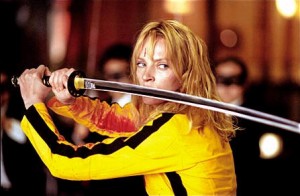 Kill Bill is like Cinematic Doo Doo. And I don’t mean that in necessarily a negative way. Writer/Director Quentin Tarantino is taking all of the movies he digested as a teenager and shitting them all over the audience. Whether you choose to be a coprophiliac is up to you. Sometimes I was hungry, other times I wasn’t. Genre splicing and riffing on 70’s films is ok by me, and he certainly managed to do that exceptionally well with his other 3 films. But the difference is that Pulp Fiction, Jackie Brown, and Reservoir Dogs actually transcended the material he was stealing from (or paying an homage to, depends on who’s saying it) and the movies took on a life of their own. Kill Bill never accomplishes this, although I’m not sure it was intended to. Having panache about how and where you steal from is not an exceptional talent.
Kill Bill is like Cinematic Doo Doo. And I don’t mean that in necessarily a negative way. Writer/Director Quentin Tarantino is taking all of the movies he digested as a teenager and shitting them all over the audience. Whether you choose to be a coprophiliac is up to you. Sometimes I was hungry, other times I wasn’t. Genre splicing and riffing on 70’s films is ok by me, and he certainly managed to do that exceptionally well with his other 3 films. But the difference is that Pulp Fiction, Jackie Brown, and Reservoir Dogs actually transcended the material he was stealing from (or paying an homage to, depends on who’s saying it) and the movies took on a life of their own. Kill Bill never accomplishes this, although I’m not sure it was intended to. Having panache about how and where you steal from is not an exceptional talent.
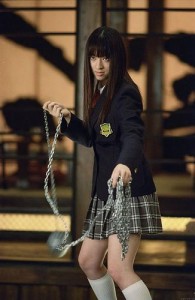 What Tarantino is doing shows an enormous contempt for the audience, because he assumes that either they won’t be familiar with the material and read it as entirely new, or the fan who does recognize will simply smile at recognizing the reference. It reminded me of the newer Leslie Nielsen type spoofs, where it is no longer necessary to actually parody the material, simple replication will do. What is different about this movie from a lot of other schlocky kung fu movies and revenge melodramas? Nothing really, except the large budget, which is what made the types of movies Kill Bill co-opts from didn’t have, and that’s what provided them with a gritty, dirty charm.
What Tarantino is doing shows an enormous contempt for the audience, because he assumes that either they won’t be familiar with the material and read it as entirely new, or the fan who does recognize will simply smile at recognizing the reference. It reminded me of the newer Leslie Nielsen type spoofs, where it is no longer necessary to actually parody the material, simple replication will do. What is different about this movie from a lot of other schlocky kung fu movies and revenge melodramas? Nothing really, except the large budget, which is what made the types of movies Kill Bill co-opts from didn’t have, and that’s what provided them with a gritty, dirty charm.
There is an arrogance to this cinema of cool, where all it takes is an acknowledgment that the director has seen the same movies you have, to suddenly cut him some slack and let him get away with sloppy thievery. In previous films, Tarantino used actors who’s career had long since been considered dead (Robert Forster, Pam Grier, Travolta, Lawrence Tierney) to great effect, and it made you realize that they had been neglected and there was a great actor in there who had been saddled with a poor rep or pissed off the wrong casting directors. But thrown into the middle of the action of Kill Bill is a scene where Uma Thurman goes to Okinawa to have a sword made. She ambles into an empty sushi restaurant and has a talk with the owner/chef who is none other than Sonny Chiba (who I guess should thank Tarantino for his resurgence because of his reference in True Romance). This scene and the followup with Chiba go on forever, perhaps 20 minutes of screen time. The only thing accomplished in all of this is that Chiba makes Uma Thurman a sword. There is a hint of his backstory, but not much, and no reasoning given to why he is where he is and has been for so long. There’s a lot of cliched material about the profundity of the sword and on and on, but it seems as if the scene is only there because Tarantino wanted to cast Chiba. We don’t get to seem him fight, and he has a hammy yelling contest with his assistant about sake, which I guess is supposed to justify his appearence. These scenes stop the movie dead in its tracks.
 Now I shouldn’t say that the whole movie was awful, because it wasn’t. It just tended to move in fits and starts. The fight scenes that are built up to, one with Vivica Fox the other one with Lucy Liu are protracted and sort of unsatisfying in their lack of ingenuity or originality. The most notable fight is at the Blue Leaves restaurant, where Uma fights off many many Yakuza and removes many many limbs. That reached the orgiastic heights that Tarantino was probably going for in terms of going ridiculously over the top. It reminded me heavily of the lawnmower scene in Dead Alive (Braindead), but not quite as inventive or funny. At no point was I ever taken out of the fact that most of this scene seemed like an homage to Monty Python and the Holy Grail mixed with the Baby Cart series. It didn’t have the balletic feel of the great wire fu, something like the crowd scene in The Legend of Fong Say Yuk or the restaurant scene in Drunken Master II. Nothing really jumped out at you, it was just there.
Now I shouldn’t say that the whole movie was awful, because it wasn’t. It just tended to move in fits and starts. The fight scenes that are built up to, one with Vivica Fox the other one with Lucy Liu are protracted and sort of unsatisfying in their lack of ingenuity or originality. The most notable fight is at the Blue Leaves restaurant, where Uma fights off many many Yakuza and removes many many limbs. That reached the orgiastic heights that Tarantino was probably going for in terms of going ridiculously over the top. It reminded me heavily of the lawnmower scene in Dead Alive (Braindead), but not quite as inventive or funny. At no point was I ever taken out of the fact that most of this scene seemed like an homage to Monty Python and the Holy Grail mixed with the Baby Cart series. It didn’t have the balletic feel of the great wire fu, something like the crowd scene in The Legend of Fong Say Yuk or the restaurant scene in Drunken Master II. Nothing really jumped out at you, it was just there.
Regarding the indulgence of references, while the spaghetti western stuff, Death Wish material, kung fu indulgences are endlessly apparent, there are clear ones to De Palma (who did make Blow-Out, which is apparently Tarantino’s favorite film), that didn’t really serve much purpose. A long use of split screen and a reconfiguring of Pino Donaggio music has to be used for a reason, not just to say that Quentin also enjoyed Dressed to Kill. The problem I had was that I was constantly aware that I was watching a movie. The stilted dialogue I assume was intended to emulate the stiffness of kung fu movie translations, came off as just stiff. It’s nice that Tarantino wants the audience to feel like he’s sitting next to them, nudging them in the ribs, going “isn’t that cool?” But after 35 minutes of the same tricks, my ribs were sore.
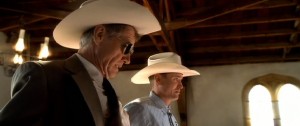 All of that wouldn’t matter if we had been made to care about Uma’s character. But Tarantino doesn’t provide her with anything at all, just that she’s taking revenge on an unseen Bill who killed her groom to be and a bunch of wedding guests. From the mass promotion of the movie, I have culled that Bill wanted to kill her because he was jealous that she was getting married and decided that no one could have Uma but him. But that actually isn’t in the movie at all and I wonder how Tarantino expected to get that information across if he didn’t have the press circuit to do so. We don’t even know if Uma used to be in Bill’s gang, or just a trained killer herself, or what the event was that triggered her defection, or whether Bill was even on the same side. Simple backstory that could have been solved in three or four lines of exposition dropped in throughout. So basically, we were just supposed to care, because.
All of that wouldn’t matter if we had been made to care about Uma’s character. But Tarantino doesn’t provide her with anything at all, just that she’s taking revenge on an unseen Bill who killed her groom to be and a bunch of wedding guests. From the mass promotion of the movie, I have culled that Bill wanted to kill her because he was jealous that she was getting married and decided that no one could have Uma but him. But that actually isn’t in the movie at all and I wonder how Tarantino expected to get that information across if he didn’t have the press circuit to do so. We don’t even know if Uma used to be in Bill’s gang, or just a trained killer herself, or what the event was that triggered her defection, or whether Bill was even on the same side. Simple backstory that could have been solved in three or four lines of exposition dropped in throughout. So basically, we were just supposed to care, because.
I read about Tarantino taking pride in what movies he was going to mash into one, and what I took note of was his mention of Female Convict Scorpion, which is the best women-in-prison movie ever made, a surrealist masterpiece that includes a political commentary hiding in with the generic material. I had hoped that Tarantino would use some of the bizarre visual style that dominated that movie, or perhaps somehow incorporate the feel of the silent yet vicious performance of the lead of FCS. But Uma Thurman never really came across as anything else than a revenge pawn, never quite menacing, and I was always distracted by the occassional use of the stuntman, since her performance is primarily physical. Watch the scene where a fight is entirely played in silhouette at the Blue Leaves and see how Uma is suddenly much shorter and bulkier.
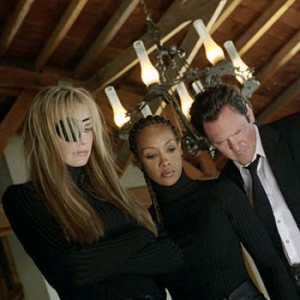 However, I don’t quite understand what the complaint about the splitting of the movie is. At the end, I’d had enough of what was being offered, and it properly concluded on a cliffhanger. If it had been 3 hours, I probably would have had to go outside and take a walk, considering how exhausting the movie is.
However, I don’t quite understand what the complaint about the splitting of the movie is. At the end, I’d had enough of what was being offered, and it properly concluded on a cliffhanger. If it had been 3 hours, I probably would have had to go outside and take a walk, considering how exhausting the movie is.
Tarantino sells the audience short because he did nothing but replicate. He didn’t add any spin. Unless someone can provide some example of his spin, and not just that he threw a 70’s song in there during a fight. His other films take off from the homage point, they don’t revel in them, and they attempt to expand upon typical genre conventions. Kill Bill doesn’t even put in the effort.
Simply loving B movies and showing that affection off does not make something a good movie. I’ve seen almost as many grindhouse movies as he has and I don’t think that if I made a movie and disguised my lack of ingenuity by pretending it was an homage, that you’d be very accepting of it. Is the spin that he combined elements of hundreds of sources that hadn’t quite been put in that order or context? Part of my dislike of the film had to do with the fact that he was so lazy when there was such oppoprtunity to wow us. The movies that he loves should be a jumping off point, not an end point.
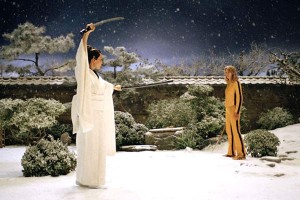 Basically what Tarantino did was write a script and say to himself, “Hey I really liked that Spaghetti Western, I’m going to use that section of Once Upon a Time in the West. And that fight in that Shaw Brothers movie, lemme use that. Ooh I loved Battle Royale and the Kinji Fukasaku Yakuza movies, let’s find a great scene and plop it right in there. I liked Female Convict Scorpion, let’s use the shrill music. And how about breaking it up into chapters to pretend it has an epic feel?” etc. etc. etc. He probably did this for months. The whole movie is like a film geek’s bibliography for a paper. Not the actual paper, but just the sources. If you recognize all the sources and you say, “I’ve seen that before” is that supposed to be enough? Am I playing a cinematic game of Where’s Waldo?
Basically what Tarantino did was write a script and say to himself, “Hey I really liked that Spaghetti Western, I’m going to use that section of Once Upon a Time in the West. And that fight in that Shaw Brothers movie, lemme use that. Ooh I loved Battle Royale and the Kinji Fukasaku Yakuza movies, let’s find a great scene and plop it right in there. I liked Female Convict Scorpion, let’s use the shrill music. And how about breaking it up into chapters to pretend it has an epic feel?” etc. etc. etc. He probably did this for months. The whole movie is like a film geek’s bibliography for a paper. Not the actual paper, but just the sources. If you recognize all the sources and you say, “I’ve seen that before” is that supposed to be enough? Am I playing a cinematic game of Where’s Waldo?
Think about what he (and Roger Avary who gets no credit) did with the True Romance script. The movie is Badlands to a T (including the note for note score). But he came up with fresh riffs and wonderfully funny and violent scenes. There are great isolated moments of character. And of course there is the legendary confrontation between Walken and Hopper, surely one of the best scenes ever put on film. True Romance is extremely entertaining and even if the material appears familiar, it never feels borrowed or stolen. Tarantino does nothing of the sort in Kill Bill, just spits back what he’s seen before and hopes we don’t recognize it.
 Regarding the neccesity of the time frame thing:
Regarding the neccesity of the time frame thing:
What I’ve read is that Tarantino may have been riffing on the fact that the black person in a movie, always dies first. However, that doesn’t really figure in at all. Uma doesn’t use the sword against Vernita, which obviously would have come in handy. So the time frame thing makes even less sense. They’ve even established the Pussy Wagon (a cute joke at first, but screams “look at me, I’m clever in my vulgarity” as it keeps cutting back to it) as the Nurse’s car, and probably not something she’d able to go to Japan, and come back and still have lying around. Wouldn’t the police be looking for it by then (the guy who owns it, was killed after all), especially something so garish and loud? So it was a pointless trick to add a bit of “style.”
Among most people, I’ve noticed this there is only one side to seeing it. Either, you love it, or you’re a party pooper. In other words, this movie is above criticism. Since when is stealing not only accepted, but encouraged?
Godard said one of the most intelligent things ever about film. “The best way to critique a film is by making another one.” Well a real artist holds certain works of art so dearly because secretly, they want to improve upon them, which is an a way, it’s own kind of criticism. But Tarantino hasn’t made “another” film, that would serve as a sort of critique, he’s made the same one.
 I can see that Kill Bill Vol. 1 is very well made, but I wished Tarantino had cut back the Chiba scene significantly, it slows down everything and serves no purpose other than to play an extended version of the joke in Jay and Silent Bob Strike Back, “Hey look kids, it’s Sonny Chiba!” I still didn’t see one thing I had not seen before for the entire 110 minutes, and I don’t see why that is not an acceptable reason to be disappointed in the film. The whole thing had such potential, but it appeared to me to be on lazy auto-pilot.
I can see that Kill Bill Vol. 1 is very well made, but I wished Tarantino had cut back the Chiba scene significantly, it slows down everything and serves no purpose other than to play an extended version of the joke in Jay and Silent Bob Strike Back, “Hey look kids, it’s Sonny Chiba!” I still didn’t see one thing I had not seen before for the entire 110 minutes, and I don’t see why that is not an acceptable reason to be disappointed in the film. The whole thing had such potential, but it appeared to me to be on lazy auto-pilot.
Tarantino’s other movies do transcend their influences, even something like Reservoir Dogs, which can easily be accused of downright thievery from City on Fire, takes on an unexpcted emotional level, especially in dealing with the intimacy between Mr. White and Mr. Orange. Pulp Fiction takes elements of pulp novels, Godard, blaxploitation, noir, and endless other places, but doesn’t simply replicate them as Kill Bill does. The core of Pulp Fiction is Jules’ final moving speech to Ringo, which gives meaning to the entire enterprise. Its inclusion is one of the major things that distinguishes the mastery of Pulp Fiction from the homage/brown-nosing of Kill Bill. If I don’t care about the people, because nobody bothered to fill them in, and there aren’t any funny lines, because the dialogue is stylistically stiff when not mixed with odd pop culture references (the Trix reference was so self conscious and cutesy, it took me right out of the scene) there is nothing to distract me, and all I am looking at is the style. And when the style is simply glued together from other places, I am not left with much. How is this different than watching a well made version of Underworld?
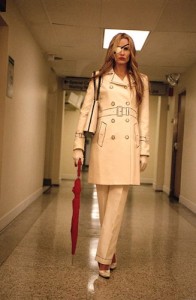 I have no objection to the notion of formula, but there are filmmakers who take the formula as a jumping off point, and turn it into something new, something like Unfaithful (yes I know it’s a remake, but the third act was remarkable, and apparently all new material), or just follow the same established pattern and make sure not to change anything so the audience doesn’t get what they want, like, say, Swimfan. Pauline Kael said when she reviewed Star Wars that the movie was so popular because it was reassuring the first time around, because all of the elements were so familiar, that people felt they knew the situations and characters as they were experiencing them for the first time. That’s because they did, they had seen them many times before from all of the sources Lucas was using. That is a constant problem with movies made since then, they don’t want to disappoint the audience by not giving them what they expect. People get scared by things that don’t follow the formula, they call them “weird” and try to forget they exist. Ever ask the general Blockbuster aficionado what they thought of Being John Malkovich? It’s like they resent the fact that they didn’t know what was going to happen, or that surprises occurred every 10 minutes or so. My objection to Kill Bill is that Tarantino got on the formula/homage trail, and never swerved, because “it’s dangerous when you go off the beaten path.” All I ask is that he take chances and not be so petrified of failing, which is why Kill Bill plays so safe.
I have no objection to the notion of formula, but there are filmmakers who take the formula as a jumping off point, and turn it into something new, something like Unfaithful (yes I know it’s a remake, but the third act was remarkable, and apparently all new material), or just follow the same established pattern and make sure not to change anything so the audience doesn’t get what they want, like, say, Swimfan. Pauline Kael said when she reviewed Star Wars that the movie was so popular because it was reassuring the first time around, because all of the elements were so familiar, that people felt they knew the situations and characters as they were experiencing them for the first time. That’s because they did, they had seen them many times before from all of the sources Lucas was using. That is a constant problem with movies made since then, they don’t want to disappoint the audience by not giving them what they expect. People get scared by things that don’t follow the formula, they call them “weird” and try to forget they exist. Ever ask the general Blockbuster aficionado what they thought of Being John Malkovich? It’s like they resent the fact that they didn’t know what was going to happen, or that surprises occurred every 10 minutes or so. My objection to Kill Bill is that Tarantino got on the formula/homage trail, and never swerved, because “it’s dangerous when you go off the beaten path.” All I ask is that he take chances and not be so petrified of failing, which is why Kill Bill plays so safe.
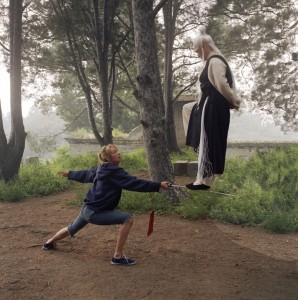 Kill Bill vol. 2 was a minor improvement over the first installment as it had some terrific sequences like the Daryl Hannah fight and the opening wedding rehearsal massacre (on top of the over the top silliness of the pregnancy test sequence and the well handled structure of the burial scene). And there was also far more background on The Bride, though one or two more scenes on her past with Bill would have been a better idea, as the dedication she has to him as well as his fixation on her needed a bit more time to be believable (especially considering the 4 hour running time). Gordon Liu’s scenes were much better handled than the similar stuff with Sonny Chiba in part 1, but after the first few beard tugs, it ceased being a motif or business, and became an annoying crutch, which distracted from the point. But repetition in playing with facial hair was not the only such instance of monotony.
Kill Bill vol. 2 was a minor improvement over the first installment as it had some terrific sequences like the Daryl Hannah fight and the opening wedding rehearsal massacre (on top of the over the top silliness of the pregnancy test sequence and the well handled structure of the burial scene). And there was also far more background on The Bride, though one or two more scenes on her past with Bill would have been a better idea, as the dedication she has to him as well as his fixation on her needed a bit more time to be believable (especially considering the 4 hour running time). Gordon Liu’s scenes were much better handled than the similar stuff with Sonny Chiba in part 1, but after the first few beard tugs, it ceased being a motif or business, and became an annoying crutch, which distracted from the point. But repetition in playing with facial hair was not the only such instance of monotony.
All that self-consciously cute dialogue was such a burden. It’s one thing when Tarantino thinks he’s being clever, it’s another when the characters think it too. Anytime the action slows down and isn’t giving us exposition or backstory, Uma, Carradine, Madsen, Hannah utter words that don’t resemble a conversation, but rather people who can’t wait to out-coy each other with puns and declarations which seem destined to be trailer moments but would be the kind of material you would cut out of your movie.
There seemed to be less cross-referencing than in volume 1 (which could have been made by Dennis Miller), and we had more of a samurai Spaghetti Western, with the constant close-ups and studies of faces, the Morricone style music, etc. I would hope that he realizes the irony in making an updated version of a Leone film and adding swordplay, when Leone with A Fistful of Dollars, was taking Kurosawa with Yojimbo and removing the swords and replacing them with guns.
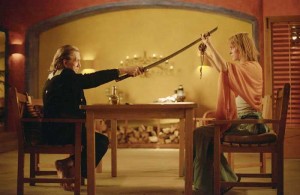 Tarantino made an odd decision with regards the construction seeing that the pacing was perfect in the middle section, but Bill’s final chapter slows things down to a halt after the blistering gouge fight. There’s the nice set-up with Parks scene as the Mexican pimp (looking nothing like he normally would), but the sapfest conclusion and the piddling fight with Bill after some 225 minutes of patience ends the movie on a whimper.
Tarantino made an odd decision with regards the construction seeing that the pacing was perfect in the middle section, but Bill’s final chapter slows things down to a halt after the blistering gouge fight. There’s the nice set-up with Parks scene as the Mexican pimp (looking nothing like he normally would), but the sapfest conclusion and the piddling fight with Bill after some 225 minutes of patience ends the movie on a whimper.



